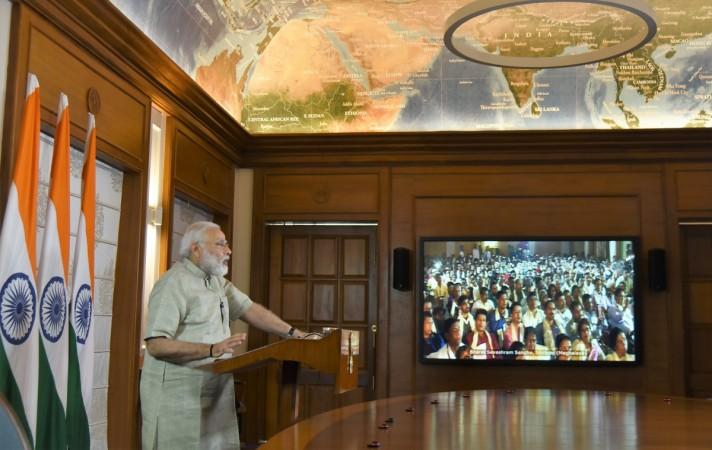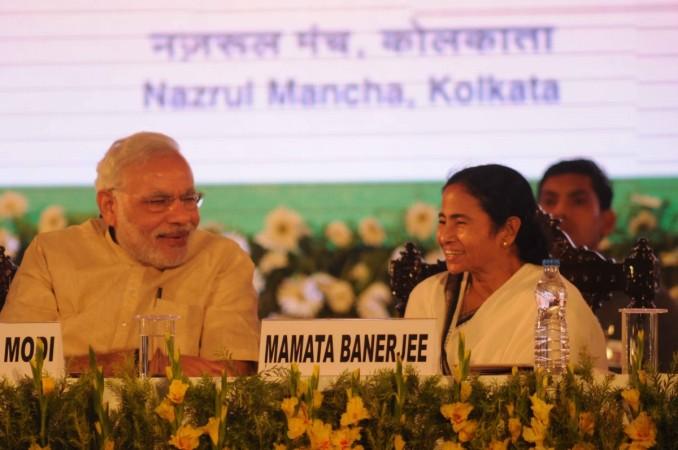
Pakistani Prime Minister Nawaz Sharif on Friday (May 12) travelled to Beijing to attend the high-profile international gathering which is part of the Asian giant's Silk Road Initiative launched by President Xi Jinping in 2013.
Though there is nothing new in Sharif visiting China, Pakistan's all-weather friend, there is certainly eye-catching about the premier leaving for the mega event (it will be attended by 27 countries) with the chief ministers of the four Pakistani provinces apart from a high-level delegation. It shows how much importance Pakistan has given to China's big idea which can really prove to be a game-changer in the days to come.
Taking a cue from Pakistan, why don't we see a similar exercise in India where its prime minister is accompanied with regional leaders who matter in issues of international importance?
Why Tamil Nadu CM doesn't join PM Modi to Sri Lanka?
Take for example, PM Modi's current visit to Sri Lanka. Why don't we see Tamil Nadu Chief Minister Edappadi Palaniswami accompanying the PM to the country? Even after the exit of Jayalalithaa from the scene and the retreat of an ageing Karunanidhi, the Tamil factor is always significant as far as India's Sri Lanka policy is concerned. Why not make the Tamil leadership a party to New Delhi's message to build rapport with the Lankans? Apart from dealing with the China's growing strategic clout, it would also help in building confidence with Sri Lanka from an ethnic perspective.
Why UP and Bihar CMs do not accompany Indian PM to Nepal?
Similarly, when Modi visits Nepal, it is disappointing to see that there is no chief minister of Uttar Pradesh or Bihar featuring in the delegation accompanying the prime minister. Nepal has a porous border with India and it is often a reason of problems like trafficking and terrorism. How much can New Delhi aspire to settle border problems with its northern neighbour if the two states bordering it are not party to bilateral initiatives?
Why CMs from NE are not made part of PM's teams to Bhutan & Bangladesh?
Again, neither of the chief ministers of Sikkim, West Bengal, Assam or Arunachal Pradesh are seen with Modi when he visits Bhutan. The only exception was the Bangladesh visit of 2015 when Modi and Mamata Banerjee were present together in Dhaka (they did not go together though) and it so happened because both countries had high stakes in resolving pressing issues like the enclave-swapping. The land deal was settled which shows how involvement of the local leadership can help seal even important international issues.

True, the Teesta water-sharing treaty has not been settled yet despite involving Banerjee but at least the talks are on to convince her. Had there been no presence of the West Bengal chief minister, the matter would have remained stuck for ever. Ask Manmohan Singh.
Okay, Mamata was a part of the Teesta affair, but what about Sikkim' CM Chamling?
However, though Banerjee was a part of Modi's itinerary during his 2015 visit to Dhaka or early this year when Bangladeshi Prime Minister Sheikh Hasina paid a visit to India, we have never seen any other chief minister from states in the north-east that border Bangladesh joining the party. Will their presence not boost New Delhi's Bangladesh policy?
Even in the Teesta issue, what's the relevance of the meeting if Sikkim, where the river originates, is not a party to the discussion? What is more surprising is that the ruling party of Sikkim, the Sikkim Democratic Front, is a part of the North East Democratic Alliance or NEDA.
Centre alone custodian of national interests? In business, it's not the case
The problem with Indian federalism is that even while the states are growing in stature, it is the Centre alone which is seen as the main custodian of the national interests. However, when it comes to the business interests, we often see chief ministers of various states engaging with foreign partners and even governments. The current PM, during his days as the chief minister of Gujarat, was known for his frequent foreign engagements.
Even Mamata, who otherwise leads an economically stagnant state, has been seen making business trips abroad seeking investments. Thus, if the chief ministers of states can play a big role when it comes to business and show their independence of sort, why the same is not seen in issues that fall under foreign affairs?
Our politics is too divisive
The answer to this question is the political animosity. The leaders of India are so fond of opposing each other that they do not care for any consensus in matters of national importance. We have seen in the past how the Centre surrendered before the will of a stubborn Jayalalithaa or Mamata in matters of foreign policy.
The local leaders, instead of strengthening their country's stand internationally, have found playing vote-bank politics using the 'international' more beneficial. They speak about federal politics when it suits their interests but forgets it when it doesn't.
If Pakistan, with a poor record of democracy can understand this small but much-needed skill, why can't we?
















